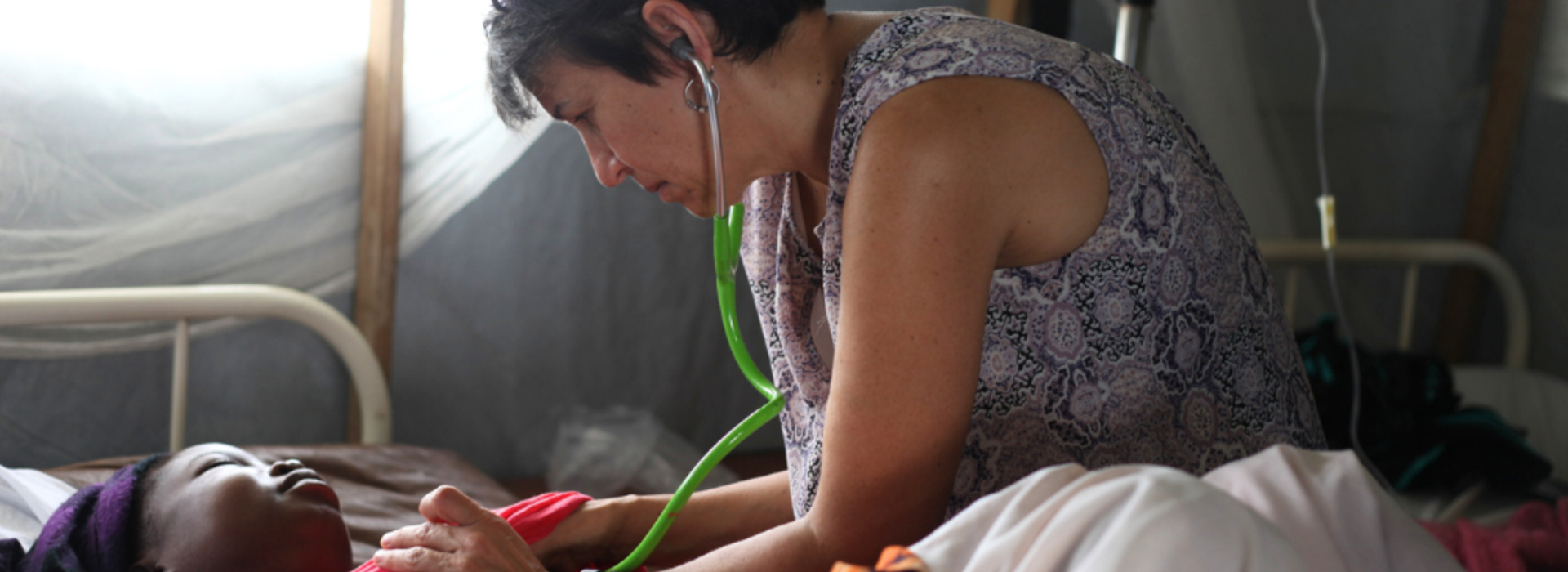
Alum Dr. Joia Mukherjee Receives Steven E. Weinberger Award from American College of Physicians
Alum Dr. Joia Mukherjee Receives Steven E. Weinberger Award from American College of Physicians
Dr. Mukherjee, a 1992 U of M Medical School graduate, is recognized for her two decades of leadership at the non-profit organization Partners in Health founded by the late Dr. Paul Farmer.
Dr. Joia Mukherjee, Chief Medical Officer of the international non-profit Partners in Health (PIH) and U of M Medical School alumna, received the American College of Physicians (ACP) prestigious Steven E. Weinberger Award for Physician Executives/Leaders. Dr. Mukherjee’s influential work is driven by her deeply-held values of justice and health equity.
“My dad was from India, and I visited India as a young person. I saw leprosy, which was very upsetting, and witnessed the brutality of poverty and how it gets into the body as a form of severe illness,” she says.
“In high school, I read speeches by Nelson Mandela and Martin Luther King linking health to struggles for justice, and I was hooked.”
Dr. Mukherjee’s career took flight in 1988 when she enrolled at the U of M Medical School.
“Minnesota was the obvious, obvious choice,” Dr. Mukherjee explains. “I wanted to go to a place where I felt like people were kind and the focus was on patients and communities.”
She unearthed her passion for health justice at the U of M by engaging in activist movements, undertaking international health projects and working directly with refugees and victims of violence. This work deepened her conviction to work toward health equity and became the groundwork for her entire career.
“I went to college at 17, and I just said, ‘Yeah, I’m going to be pre-med.’ But I didn’t have a clear why,” she recalls.
Dr. Mukherjee spent time with poor communities, both in the U.S. and abroad, addressing poverty and access to health care, and that work became her why.
“Much of my recognition of purpose was forged in the U of M’s intellectually stimulating and deeply compassionate environment,” she says.
After two years of residency in internal medicine-pediatrics at the U of M, Dr. Mukherjee traveled to Uganda with Minnesota International Health Volunteers. Upon completion of her residency and infectious disease fellowship at Harvard, she met Dr. Farmer, and in 2000, accepted the position of Chief Medical Officer of PIH and became a faculty member at Harvard Medical School.
“At the time, PIH was a very tiny charity. I was attracted to PIH because the small team in Haiti was treating people living with HIV with potent antiretroviral drugs that weren’t available anywhere else in the developing world,” Dr. Mukherjee says. “I thought I’d work in Haiti and with PIH for a year, and now I’ve been doing this for 24 years.”
Dr. Mukherjee’s work focuses on strategy of care delivery, developing programs to treat common global illnesses. She spends about a quarter of her time abroad, where she sees complicated patients with tuberculosis or HIV alongside teams of local doctors, nurses and community health workers. Dr. Mukherjee is also committed to education, publishing a textbook on global health with Oxford University Press and creating a global health Masters program at Harvard University.
Under the direction of Dr. Mukherjee and leadership, PIH has grown from a small, relatively unknown non-profit with a staff of roughly 250 in 1999 to a well-known global powerhouse employing 19,000 individuals across the world.
“It used to be, if I gave a lecture, it’d be in kind of an empty room,” Dr. Mukherjee says. “That was even true of Dr. Farmer when we met. And now there are thousands and thousands of people who want to participate.”
Looking to the next 24 years, her hope is to honor the legacy of the late Dr. Farmer and see health equity be viewed as a multi-disciplinary issue.
“My hope is that we will learn to operationalize equity,” she asserts. “That we will not take medicine as a biological field, but rather a social one, and really commit to resourcing what people need. I think that’s the legacy of Dr. Farmer, the deep work of walking with people, listening to them, learning from them and working together to design strategies. That’s the way to deal with inequity.”